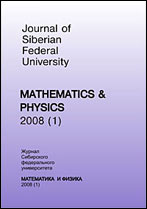|
This article is cited in 1 scientific paper (total in 1 paper)
Two-layer stationary flow in a cylindrical capillary taking into account changes in the internal energy of the interface
Victor K. Andreevab, Natalya L. Sobachkinab
a Institute of Computational Modelling SB RAS, Krasnoyarsk, Russian Federation
b Siberian Federal University, Krasnoyarsk, Russian Federation
Abstract:
The problem of two-dimensional stationary flow of two immiscible incompressible binary mixtures in a cylindrical capillary in the absence of mass forces is investigated. The mixtures are contacted through a common the interface on which the total energy condition is taken into account. The temperature and concentration in the mixtures are distributed according to a quadratic law, which is in good agreement with the velocity field of the type Hiemenz. The resulting conjugate boundary value problem is nonlinear and inverse with respect to the pressure gradients along the axis of the cylindrical capillary. The tau-method (a modification of the Galerkin method) was applied to this problem, which showed the possibility of the existence of two solutions. It is shown that the obtained solutions with a decrease in the Marangoni number converge to the solutions of the problem of the creeping flow of binary mixtures. When solving the model problem for small Marangoni numbers, it is found that the effect of the increments of the internal energy of the interfacial surface significantly affects the dynamics of flows of mixtures in layers.
Keywords:
binary mixture, interface, internal energy, inverse problem, pressure gradient, thermal Marangoni number.
Received: 10.03.2021
Received in revised form: 05.04.2021
Accepted: 20.05.2021
Citation:
Victor K. Andreev, Natalya L. Sobachkina, “Two-layer stationary flow in a cylindrical capillary taking into account changes in the internal energy of the interface”, J. Sib. Fed. Univ. Math. Phys., 14:4 (2021), 507–518
Linking options:
https://www.mathnet.ru/eng/jsfu936 https://www.mathnet.ru/eng/jsfu/v14/i4/p507
|

| Statistics & downloads: |
| Abstract page: | 131 | | Full-text PDF : | 47 | | References: | 30 |
|




 Contact us:
Contact us: Terms of Use
Terms of Use
 Registration to the website
Registration to the website Logotypes
Logotypes









 Citation in format
Citation in format 